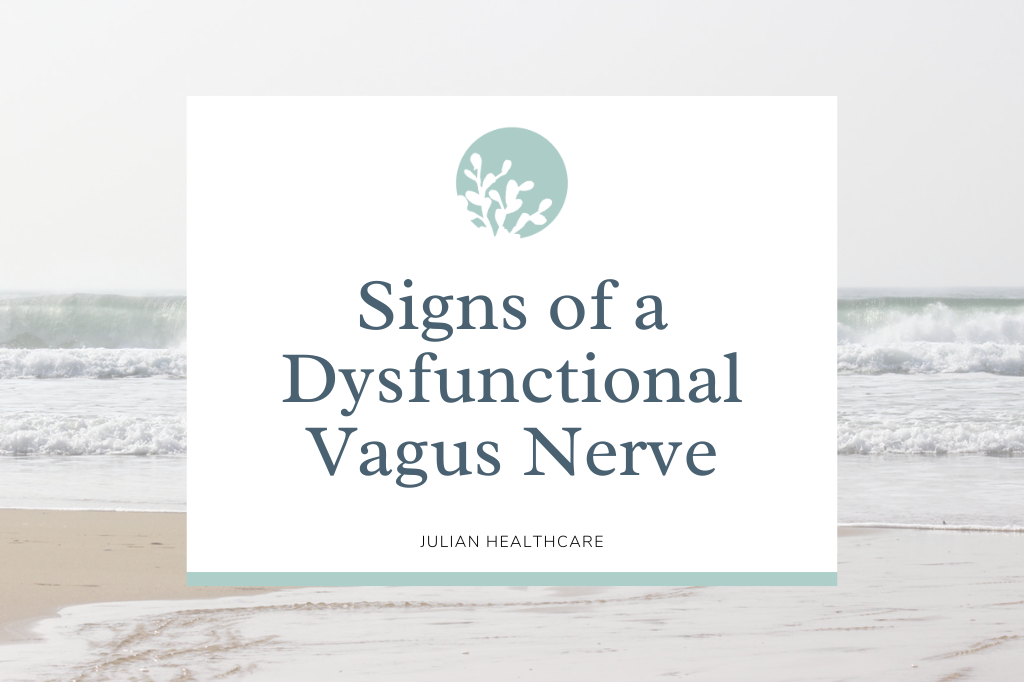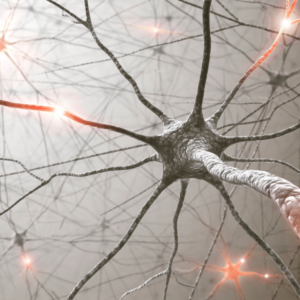As women approach perimenopause and menopause, their bodies go through significant changes that can affect nearly every aspect of their health. One key player in overall wellness that often goes unnoticed is the vagus nerve. This nerve is responsible for many critical functions. When it isn’t working as it should, it can contribute to a range of uncomfortable symptoms—some of which are commonly experienced during menopause. Understanding the signs of a dysfunctional vagus nerve and how to support it can make a world of difference in how you feel day to day.
What is the Vagus Nerve?
The vagus nerve is the longest cranial nerve in the body, running from the brainstem all the way down to the abdomen. It’s a major part of the parasympathetic nervous system, which is responsible for the “rest-and-digest” functions of the body. This system helps us relax, recover from stress, and maintain balance in our digestion, heart rate, and immune response. Think of the vagus nerve as the control center for calming your body after stressful events.
When the vagus nerve is functioning well, it promotes feelings of calm and helps reduce inflammation. However, when it becomes dysfunctional, the effects can be widespread, influencing everything from your mood to your gut health.
How the Vagus Nerve Impacts Physical Health
For many women in perimenopause and menopause, stress, inflammation, and digestive issues are common struggles. What you might not realize is that the vagus nerve is deeply connected to each of these concerns.
- Gut Health: The vagus nerve plays a significant role in regulating digestion. Dysfunction can lead to digestive issues such as bloating, constipation, or IBS-like symptoms, which can become more prominent during midlife hormonal shifts.
- Hormone Balance: The vagus nerve helps regulate the body’s stress response, which is closely linked to hormone production. As hormones fluctuate during perimenopause and menopause, vagus nerve dysfunction can make it harder for the body to manage stress, contributing to symptoms like hot flashes, mood swings, and insomnia.
- Mood and Mental Health: A dysregulated vagus nerve has been linked to anxiety, depression, and brain fog—all of which can become more pronounced during hormonal changes.
Signs and Symptoms of a Dysfunctional Vagus Nerve
If your vagus nerve isn’t functioning as it should, you may experience a variety of symptoms. Some of the most common signs include:
- Chronic inflammation and frequent infections
- Digestive disturbances like bloating, constipation, or diarrhea
- Anxiety or depression that feels hard to manage
- Fatigue and low energy levels
- Irregular heartbeats or heart palpitations
- Difficulty managing stress or feeling constantly on edge
- A “lump in the throat” sensation or difficulty swallowing
These symptoms can often be mistaken for just part of aging or hormonal changes, but they can be signals that your vagus nerve needs support.
Ways to Stimulate and Support Your Vagus Nerve
The good news is there are plenty of natural ways to stimulate the vagus nerve and improve its function. Here are a few effective methods:
- Deep Breathing: Slow, diaphragmatic breathing activates the vagus nerve and promotes relaxation. Try practicing deep breathing for 5-10 minutes daily.
- Cold Exposure: A splash of cold water on your face or a cold shower can stimulate the vagus nerve, triggering the body’s calming response.
- Singing, Humming, or Gargling: These actions stimulate the muscles at the back of the throat, which are connected to the vagus nerve.
- Mindfulness and Meditation: Practices like meditation and yoga help activate the parasympathetic nervous system, improving vagus nerve function over time.
- Gut Health: A healthy gut supports vagus nerve function, so eating probiotic-rich foods or taking a quality probiotic supplement can help.
Incorporating these strategies into your daily routine can help improve vagus nerve health and lead to better overall well-being.
A Revolutionary Solution: VeRelief
For those seeking faster, more effective relief, VeRelief offers a breakthrough approach to vagus nerve stimulation. VeRelief is designed to stimulate the auricular vagus nerve located just under the ear, quickly calming the nervous system. With just one use of a VeRelief device, you can experience almost immediate relief from stress—giving you calm on command.
In studies involving over 1,000 patients, VeRelief demonstrated a remarkable 94% relaxation rate after a single use. It disrupts the “fight or flight” signal sent from the brain to the body, helping to prevent stress responses from taking full effect. The result? A nearly instant sense of calm and relaxation, faster than meditation and without the risks associated with medications.
If you’re looking for a way to manage stress during perimenopause or menopause, VeRelief could be the perfect addition to your wellness toolkit. The best part? You can use the code JULIANHEALTH10 to receive a discount on your purchase.
To learn more about the various device options and how VeRelief can support your health, visit the website for details.
Taking Charge of Your Nervous System
Your vagus nerve plays a critical role in keeping your body balanced, especially during the hormonal shifts of perimenopause and menopause. By understanding the signs of vagus nerve dysfunction and taking steps to support this essential nerve, you can reduce stress, improve your digestion, and support your overall well-being. Whether through lifestyle changes or innovative solutions like VeRelief, you have the tools to take control of your health and feel your best during this stage of life.
This blog post contains affiliate links. If you make a purchase through these links, we may earn a commission at no extra cost to you. We only recommend products we personally use and trust.




